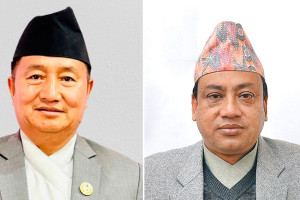Opinion
Loktantra blues
History shows that governments often make laws to punish those who speak or write freely
The Panchayat legacy
Among the politicians who have seriously spoken about loktantra was the late BP Koirala, the first elected prime minister of Nepal, who was deposed in 1960 by king Mahendra, who introduced the party-less Panchayat system of ruling that lasted until 1990.
This long rule of the Panchayat left legacies, including some ill-conceived hegemonic perceptions welcomed even by advocates of loktantra. The greatest invention of the Panchayat was a psyche of control and misusing the position of being in government. Some people holding different political ideas about freedom and democracy have carried the spectre, or bhoot, of the Panchayat polity, a sense of hegemony that justifies your action of control. Carl Schmitt’s term for that self-proclaimed and self-declared excuse of rulers to rule with full control is the ‘state of exception’. The logic is that you rule with full autocratic control, and you call that not a permanent feature but a ‘state of exception’.
Power hungry
Within just a few months of the formation of a coalition government in Nepal between the loktantric (democratic) party—the Nepali Congress (NC)—and the CPN-UML, which also vows to take the path of loktantra, the ministers and actors of this government have revealed their controlling psyche. They have chosen the legal domain to justify that state of exception. In a most ridiculous way, within months of their fragile coalition, these rulers have chosen to hit the most important and the most vital and sensitive part of a democratic system—curbing the freedom of the press and individuals to speak and share the flow of information. A bill concerning ‘contempt of court’, registered by the Law Minister at the Legislature-Parliament on June 9, can be considered a metaphor that represents the power psyche of the coalition.
The worry and vision of BP Koirala at his court hearing of 1977 was this very fragility, this vulnerability of people’s freedom, which he had hoped, his party would defend in this land.
Mavericks like us choose individuals rather than parties to pin our hopes on; we choose heroes according to their actions. The present Law Minister is one of these heroes whom we chose as one of the few heirs to BP Koirala’s vision. Disillusioned by this minister’s move, his closest friend and fellow traveller, a scholar and brilliant writer, Prof Krishna Khanal published a very well-written Op-Ed in which these words echo as warnings, “I have begun to fear now, the destroyers of loktantra force are the same people whom we have always trusted as the so-called defenders of democracy. Other factors are the anomalies acted out institutionally, and other irregularities. The enemies of loktantra are not the deposed king and his loyalists and the communist who espouse one-party rule. The Congress, UML or any other parties who claim to be believers in multi-party system, cannot be called truly loktantric parties only because they go around wearing democracy-badges. They are not at all loktantric” (Kantipur, July 6).
Who benefits?
Few party leaders with the exception of Shekhar Koirala of the NC (Kantipur, July 8) and Pradeep Gyanwali of the UML (Kantipur, June 23) have published anything significant against this move. Minister for Education Chitralekha Yadav of the NC, whom I know as my student from her MA studies in Kirtipur as an outspoken person, has recently spoken out against this attitude of curbing and harassing media freedom. Young generation academics like Ujjwal Prasai, a PhD scholar at Jawaharlal Nehru University, an erstwhile journalist and our student, has been writing about this psyche of the people in government to try their hands in exercising control on social media and creating a legal texture to curb freedom.
What is happening here then? Is the present government creating a fiefdom where benefits are siphoned off to cronies’ pockets, and a freedom-curbing law gets through the Legislature-Parliament? But who will succeed after all these, they or those who are waiting for opportunities to create a situation where all the vocal agencies are muted, punished, and downsized? But will these fiefs or spheres of control envisaged by those in government or in majority in the House always serve them?
Punishing creativity
We notice a dangerous tendency of bartering with power in Nepal where freedom is not constitutionally protected because there is no constitution. And the myadi sarkaars, or governments temporarily thrown together, dream of power on a scale that is not warranted. The issues of Dalits and the marginalised in society are getting least priority in terms of law. Why does the government not table a law against those who banish Dalits out of villages for taking water from a common spout? Is there a law to protect those helpless old women who are fed their own faeces and beaten or even killed on charges of being a ‘witch’? The answer is, power-holders only want to protect power elites.
Governments, as history shows, often make laws to punish those who speak or write their creative thoughts freely. Poets and writers, thinkers, painters, media people and dramatists are targets of autocratic laws because, as the philosophers and common freedom fighters have shown, a certain fear grips the minds of those who nourish dreams of ruling for a long time. They create laws, which ironically become their own traps.
The deep-seated albeit vainglorious power psyche could bring about a difficult situation in Nepal. The choice is either to fight the loktantra blues or serve the sovereign.




 22.66°C Kathmandu
22.66°C Kathmandu


.jpg&w=200&height=120)








